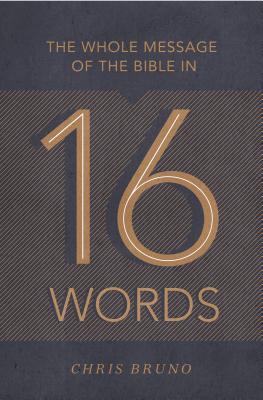First sentence from chapter one: We begin at the end, because the end actually starts in the beginning. Confused? Just hang with me for a little while, and hopefully you’ll see where we are heading. If you knew in advance that Frodo survives the journey to Mordor in The Lord of the Rings, but only barely; that Darth Vader is Luke Skywalker’s dad in Star Wars; and that Bruce Willis is dead the whole time in the Sixth Sense, would it ruin these stories? You might think that it would, but according to a 2011 study published in Psychological Science, people actually enjoy stories more when they know the ending.
Premise/plot: This one is a companion book to Chris Bruno's The Whole Message of the Bible in 16 Verses. Bruno stated the purpose for his new book quite clearly in his introduction, "In this book, I want to change our analogy. Instead of talking about the forest and the trees, I want us to see the whole story of the Bible as a rope that is woven tightly together. The goal of this book is to pull out sixteen key strands that compose this rope, look at how they contribute to the overall message, and then put them back in place." Or, "In this book, we are going to trace sixteen words that help us better understand and apply the whole message of the Bible."
The sixteen words: "The End," "God," "Creation," "Covenant," "Kingdom," "Temple," "Messiah," "Israel," "Land," "Idols," "Judgment," "Exodus," "Wisdom," "Law," "Spirit," "Mission."
Each chapter includes two connecting verses. One verse from the Old Testament and one verse from the New Testament. Each chapter ends with a GREAT summary statement.
My thoughts: Like Deron Spoo's The Good Book, Bruno seeks to address the BIG ideas of the Bible, seeks to help readers--no matter their background--understand and appreciate the big picture of the Bible.
But. Bruno does it better. He stays on-task, on-focus. The book is better focused on God and God's Glory. And this one is very meaty, very substantive, and extremely rich in insight. He is also straightforward, "If you want to know the message of the Bible, then you need to read the Bible."
I felt that Spoo's book was like a bag of potato chips--technically food--but not ultimately satisfying like a good MEAL with meat and vegetables.
Some of my favorite quotes:
This reality [Revelation 21:3-5] should change the way we see everything in the world—and the way we read everything in our Bibles. We need to see that the end of the Bible is closely connected to the beginning of the story. But we also need to see that the end of the story changes the way we live right now, because the end has already been brought into the present.
Even if you haven’t read Genesis recently, you probably know the main idea of the creation story. God made the world and everything in it. He created humans in his own image and put them in the garden of Eden. But Adam and Eve doubted God’s kindness to them and wanted to be like him, so they ate the fruit from the tree of the knowledge of good and evil (the only fruit they weren’t allowed to eat). Because of their disobedience, the world and everything in it was broken. And that is basically what we see when we look out the window or turn on the news today. We live in a world where we can still see God’s hand in both the beauty of creation and the creativity of people, but it is also a world filled with broken people looking for some way to fix everything that has gone wrong. If we really want to understand the story of the world and the story of the Bible, we need to see that God told us about the solution almost as soon as we broke the world. And he started to provide for that solution as soon as he told us about it. In Genesis 3:15, he told Adam and Eve that the seed of the woman would crush the head of the Serpent. In other words, he would undo the fall and restore his good creation. From the very beginning, God was committed to stepping into history to change it, renew it, and make it better than we could ever imagine—for our good and his glory. And that, in a nutshell, is what we mean by eschatology. While we need to see that eschatology is heading toward the end, we also need to see that the end shapes the whole story. In fact, that is how I would define eschatology—the study of God’s work in history to bring the story to his intended end. So when we talk eschatology, we have to start in Genesis.
© Becky Laney of Operation Actually Read Bible


No comments:
Post a Comment